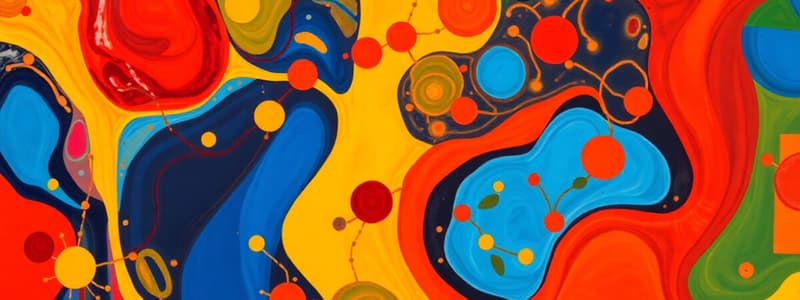Podcast
Questions and Answers
What is the primary function of cholesterol in the body?
What is the primary function of cholesterol in the body?
- It acts as a precursor for all steroid hormones. (correct)
- It aids in the digestion of carbohydrates.
- It is a signaling molecule for cell division.
- It serves as a source of energy.
Which of the following compounds can be classified as derived lipids?
Which of the following compounds can be classified as derived lipids?
- Glycerol and glucose
- Phospholipids and amino acids
- Triglycerides and glucose
- Fatty acids and cholesterol (correct)
Which lipid is the precursor to Vitamin D3?
Which lipid is the precursor to Vitamin D3?
- Glycerol
- Fatty acids
- Sterols (correct)
- Triglycerides
What type of steroid is primarily produced by the adrenal cortex?
What type of steroid is primarily produced by the adrenal cortex?
Which of the following describes the structure of a sterol?
Which of the following describes the structure of a sterol?
What is a common function of bile acids?
What is a common function of bile acids?
Which hormones are classified as corticosteroids?
Which hormones are classified as corticosteroids?
What is the relationship between derived lipids and hydrolysis?
What is the relationship between derived lipids and hydrolysis?
Which derived lipid is known as a key component of plasma membranes?
Which derived lipid is known as a key component of plasma membranes?
How are steroid hormones classified?
How are steroid hormones classified?
What is the primary role of testosterone in males?
What is the primary role of testosterone in males?
Which hormone primarily influences the secretion of glucocorticoids from the adrenal cortex?
Which hormone primarily influences the secretion of glucocorticoids from the adrenal cortex?
Which cells in the ovary are responsible for the production of estrogen?
Which cells in the ovary are responsible for the production of estrogen?
What is the main action of aldosterone?
What is the main action of aldosterone?
What is the primary function of vitamin D3 (calcitriol) in the body?
What is the primary function of vitamin D3 (calcitriol) in the body?
Which precursor hormone is synthesized by the zona reticularis of the adrenal cortex?
Which precursor hormone is synthesized by the zona reticularis of the adrenal cortex?
Which of the following actions is NOT a function of glucocorticoids?
Which of the following actions is NOT a function of glucocorticoids?
Where are bile acids primarily synthesized in the body?
Where are bile acids primarily synthesized in the body?
Which hormone is directly involved in the implantation of the ovum and maintenance of pregnancy?
Which hormone is directly involved in the implantation of the ovum and maintenance of pregnancy?
What important physiological role do bile salts serve in digestion?
What important physiological role do bile salts serve in digestion?
Flashcards
Derived Lipids Definition
Derived Lipids Definition
Compounds formed from simple or compound lipids by hydrolysis or related lipid substances, like steroids.
Fatty Acids
Fatty Acids
A type of derived lipid, crucial components of many lipids.
Glycerol
Glycerol
A derived lipid; a central component of some lipids.
Steroids
Steroids
Signup and view all the flashcards
Sterols - Structure (e.g. Cholesterol)
Sterols - Structure (e.g. Cholesterol)
Signup and view all the flashcards
Cholesterol
Cholesterol
Signup and view all the flashcards
Steroid Hormones
Steroid Hormones
Signup and view all the flashcards
Sex Hormones
Sex Hormones
Signup and view all the flashcards
Corticosteroids
Corticosteroids
Signup and view all the flashcards
Vitamin D function
Vitamin D function
Signup and view all the flashcards
Male sex hormone
Male sex hormone
Signup and view all the flashcards
Female sex hormones
Female sex hormones
Signup and view all the flashcards
Glucocorticoids (Cortisol)
Glucocorticoids (Cortisol)
Signup and view all the flashcards
Mineralocorticoids (Aldosterone)
Mineralocorticoids (Aldosterone)
Signup and view all the flashcards
Vitamin D3
Vitamin D3
Signup and view all the flashcards
Bile acids
Bile acids
Signup and view all the flashcards
Testosterone production (location)
Testosterone production (location)
Signup and view all the flashcards
Estrogen Production (location)
Estrogen Production (location)
Signup and view all the flashcards
Glucocorticoids Synthesis (location)
Glucocorticoids Synthesis (location)
Signup and view all the flashcards
Mineralocorticoids synthesis (location)
Mineralocorticoids synthesis (location)
Signup and view all the flashcards
Study Notes
Lipid Chemistry: Lecture 3 - Derived Lipids
- Derived lipids are compounds derived from simple and/or compound lipids through hydrolysis or substances related to lipids like steroids.
- Derived lipids include:
- Fatty acids
- Glycerol
- Steroids
- Sterols
- Steroid hormones
- Vitamin D
- Bile acids and salts
Sterols: Cholesterol
- Cholesterol is the precursor of all steroids.
- All steroids have a steroid nucleus.
- Cholesterol has a hydroxyl group and a hydrocarbon side chain.
Functions of Cholesterol
- Major constituent of plasma membranes and plasma lipoproteins.
- Precursor for other steroids (steroid hormones, vitamin D3, bile acids & salts, sterols).
Steroid Hormones
- Sex hormones (produced by sex organs and adrenal cortex): Estrogens, progesterone, and androgens.
- Glucocorticoids (produced by adrenal cortex): Cortisone
- Mineralocorticoids (produced by adrenal cortex): Aldosterone
- Both glucocorticoids and mineralocorticoids are called corticosteroids.
Male Sex Hormones
- Testosterone is the major male hormone.
- Testosterone is produced by the Leydig cells (interstitial cells) of the testes under the influence of LH.
- DHEA (dehydroepiandrosterone) is produced by the zona reticularis of the adrenal cortex and is a precursor to testosterone.
- Testosterone is responsible for the maturation and function of male secondary sex organs (virilization).
Female Sex Hormones
- Estrogen and progesterone are the major female sex hormones.
- Estrogen is produced by ovarian follicular cells and the adrenal cortex (zona reticularis). Estrogen is responsible for the maturation and function of female secondary sex organs (feminization).
- Progesterone is produced by the ovaries and placenta during pregnancy. It's responsible for ovulation, implantation of the ovum, and maintenance of pregnancy.
Glucocorticoids (Cortisol)
- Synthesized by the zona fasciculata of the adrenal cortex under the influence of ACTH (adrenocorticotropic hormone).
- Primarily affect glucose metabolism.
- Have diverse effects on inflammation, immunity, protein, lipid & carbohydrate metabolism.
Mineralocorticoids (Aldosterone)
- Synthesized by the zona glomerulosa of the adrenal cortex.
- Controlled by the renin-angiotensin-aldosterone system (RAAS).
- Increases sodium reabsorption and water retention.
- Leads to increased potassium excretion.
Vitamin D3
- Fat-soluble vitamin synthesized in the skin from 7-dehydrocholesterol in response to UV light.
- Cholecalciferol is activated in the liver and kidneys.
- Active form is calcitriol (1,25(OH)2D).
- Essential for calcium and phosphorus homeostasis.
Bile Acids
- Synthesized in the liver from cholesterol.
- Hydroxylation process.
- Conjugated with glycine or taurine, then secreted with bile as their sodium salt.
- Aid in the digestion and absorption of fats by forming micelles.
- Aid in fat emulsification.
Studying That Suits You
Use AI to generate personalized quizzes and flashcards to suit your learning preferences.





